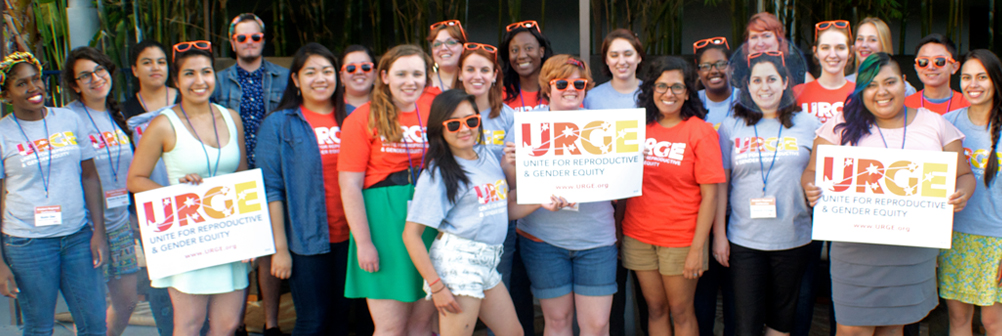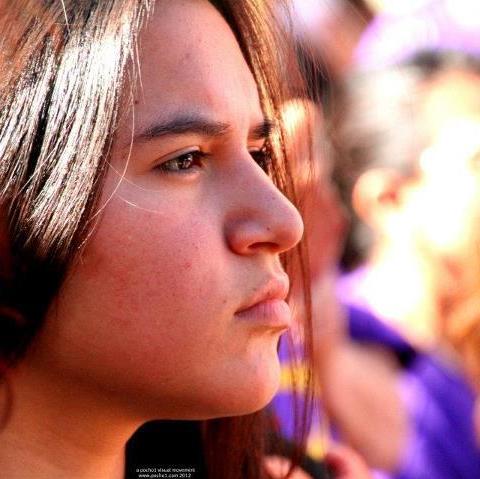Latin@s to Watch Out For: Sofia Campos
As we approach the end of Hispanic Heritage Month, URGE and National Latina Institute for Reproductive Health will be highlighting fierce young Latin@s that are doing amazing social justice work.
Name: Sofia Campos
Organization or Movement: United We Dream, Freedom Side
Twitter handle: @campoSOFIA
Not every Latin@ identifies as “Hispanic”, how do you identify and what is your heritage?
I identify as a Latina. Peruana. Mujer/Womyn. I was born in Peru, and raised in LA since I was a 6 so I’m also an Angelina. And a proud immigrant.
Is there a Latin@ leader you look up to, if so who? If not, why not?
Many, and I’m blessed to say they are my friends and colleagues. Being involved in the immigrant youth movement grants me the opportunity to know and befriend hundreds of empowered Latin@s using their skills and talents to fight for our community’s rights and freedom.
Leaders such as Cristina Jimenez, co-founder and Managing Director for United We Dream; Neidi Dominguez, a key strategist in organizing for Deferred Action for Childhood Arrivals (DACA) which we won in 2012; Imelda Plascencia, an undocuqueer healer who serves as project coordinator at the Dream Resource Center and co-founded the CIRCLE Project. There are many more I could name. One of my biggest privileges from being part of the immigrant youth movement is that the very people I most look up to are my brothers and sisters in the movement. They are smart, experienced, resilient, and determined to make positive changes for our communities–and we are not waiting until tomorrow to do it. We are making an impact today, and supporting each other in doing so.
What does it mean to be Latin@ in the United States right now?
Being Latin@ means we have a lot of extra flavor–in our food, our dance, our words, and our people! It means we are locally and globally connected. It means we hold deep wisdom in our ancestral, indigenous ways which promotes cooperation and reciprocity, protects Mother Earth, and strengthens our spiritual resilience.
It also means to be on a journey of self-discovery, one which can lead to a greater sense of dignity and power. We have deep roots, and should uncover our stories as part of and in relation to the North American narrative. By learning our ancestry, both in Latin America and in the United States of America, we can better get to know ourselves and our potential.
As we know, Latin@s are not a monolithic group– we are diverse in a multitude of ways. What other identities/struggles do you identify with and what do you think other Latin@s should be focusing on this next year?
I am an undocumented immigrant. That is the first way I think to identify because it’s the part of my journey that brought the most pain, transformation, and blessings to my life. Being a woman, Latina, daughter of immigrants, person of color, and empowered human being set on making this world a better place are all intertwined parts of my identity that make me whole and fuel my desire to help my communities.
Like Audre Lorde said, there is no such thing as a single issue struggle, because we do not lead single issue lives. I identify with every struggle that seeks to address structural inequalities, and establish rights for all. I’ve felt invisible and fearful of coming out about my undocumented status. I’ve been targeted and unfairly treated because of my race and lack of citizenship status. I was barred from getting to know my ancestors and a homeland I was relocated from. I’ve experienced the consequences of a society that values money before people and the Earth. For these reasons and more, I especially identify with LGBTQ, Black, and Indigenous people’s struggles in the U.S.
There are two crises significantly hurting Latin@s right now: the U.S. holds the world records for number of deportations and number of people incarcerated (both over 2 million). The prison and immigration industries make money off imprisoned black and brown bodies through for profit prisons and detention centers. By seeing these issues as systemic problems resulting from laws and policies designed to create them, we can unite to address root causes of our community’s problems. We should also build with Black and Asian communities, both significantly impacted by these same crises.
What is your vision for the the Latin@ community in the future– how we are seen and treated, how we show up and participate and issues we care about?
I hope we are rooted in our history–that we make the time to discover our stories which are so often excluded from classroom textbooks. I hope we engage in a process of empowerment, unity, and healing as individuals and as a community. I hope we show up for each other and for other communities with love, compassion, and a rooted sense of identity and culture.
I want our community to not be used as political pawns in someone else’s game; I want us to define our issues and use our voices with each other, not against. I want to see our community become a multi-generational stronghold, with youth leading the way towards a more equal and just society. I want us to model what an inclusive, loving, spiritual family looks and feels like because when I think of Latin@s, I think of family first. (and then really good food).


